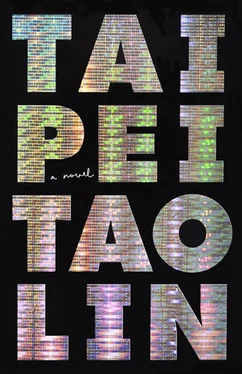“Yeah,” said Erin. “Wait, is my—”
“Smells vaguely of barbecue, but it’s good,” said Paul, and patted her shoulder.
“Vaguely of barbecue,” said Erin grinning.
In the mirror-walled elevator they stared at themselves on the screen of Paul’s MacBook, which Erin held waist level. Paul moved in a parody of a robot and lightly slapped Erin twice. Erin slapped Paul once and, after exiting the elevator, yawned audibly, as they approached an atrium of spiral staircases and a gigantic Christmas tree.
“Look,” said Paul with a fish-like expression.
Erin laughed loudly. “Jesus,” she said.
“You made a Jack Nicholson facial expression.”
“Really?” said Erin, and laughed.
“Your eyebrows went,” said Paul demonstrating.
“Whoa,” said Erin loudly. “I made a soundboard laugh.”
“Oh,” said Paul. “Oh,” he said quietly, and moved toward a potted plant and, before reaching it, jumped in place, slightly confused by his own behavior. Erin said she thought Paul was going to “jump on.” There was a suctioned, whooshing noise as they exited automatically opening doors onto a wide sidewalk. Paul turned left — into Erin, who almost dropped the MacBook — and sustained an uninhibited, yelping noise for three or four seconds, imagining himself as a butler in a Disney movie in comically prolonged recovery from almost dropping an elaborately layered tray of desserts and drinks. Paul had an urge to practice the noise repeatedly, with increasing frustration, trying to perfect it — cut-scene to him in a straitjacket.
“Jesus,” said Erin grinning. “Should I get dramatic shots of the street?”
“Whatever you want.”
“Dramatic ass shots,” said Erin.
“It’s your night,” said Paul in vague reference to the Cinderella archetype of a beautiful, oppressed, sympathetic character that experiences a hectic reversal of fortune. “I keep thinking ‘this is our night’ for some reason,” he said a few minutes later, and his eyes felt shiny, and he thought of shyness, acceptance. “I wonder what it’s going to be like for us, for our twenty days here,” he said as they crossed a street. “What are we going to. . do?”
“What if we get divorced by then?”
“It seems possible,” said Paul. “Twenty-eight days.”
“Twenty-eight days,” said Erin grinning. “Twenty-day immersion technique.”
“Have you ever spent twenty straight days—”
“Yeah,” said Erin.
“You have?”
“With Jennika. This summer, in Seattle.”
“I mean with a boyfriend,” said Paul, and imagined himself becoming physically faceted by rapidly facing different directions, in 15-degree movements, advancing blurrily ahead as a barely visible, wave-like curvature.
“Oh. Yeah. Probably.”
“Who?”
“First boyfriend. Kent.”
“Sleeping together?” said Paul suppressing an urge to scream it in mock disbelief. Erin said they were together “like every day” in the beginning and that “it seemed okay.” Paul asked what she meant by “okay” and visualized “it seemed” darkening and “okay” brightening colorfully. He mock studied “okay,” which suddenly enlarged and disappeared by “flying” through him, it seemed. Paul felt vaguely, uncertainly amused. Erin was explaining that she and Kent didn’t fight until she used his computer to write a paper and saw a folder of naked girlfriend pictures, which Kent said were from so long ago he couldn’t remember and that the girl lived in Poland and he didn’t talk to her anymore, all of which were lies.
“How do you feel about our fights so far?”
“I feel. . they seem to be okay,” said Erin descending stairs into a powerfully air-conditioned MRT station, marbled and quiet and clean, with the austere plainness of an established museum. “I still feel the same amount of interest toward you. But I think I worry more. I worry like ‘he might actually have a reaction toward this so I’ll think about it more.’ Or something. How do you think about them?”
“They seem fine,” said Paul.
“Is. . this how it usually goes?”
“Yeah,” said Paul with the word extended.
“Like the fights are similar?”
“Um, yeah. . I don’t have the kind of fight where it’s, like, ‘fighting,’ ” said Paul as they passed a bakery where he photographed and ate a crispy, red-bean-paste-filled croissant last year. “Like, yelling at each other and trying to ‘win,’ or something. Or, like, forgetting about it.”
“Or like what?”
“Like ‘winning.’ I don’t have that kind of fight.”
“Oh,” said Erin.
“Ever,” said Paul quietly.
Erin said with Kent she had the kind of fight where it turned into “proving a point,” then escalated into yelling. Paul asked if she fought with Harris, her second boyfriend.
“No,” said Erin.
“You have a curling effect,” said Paul touching her hair. “I like it. Is that what you’re going for?”
“Yeah,” said Erin smiling endearingly.
“You didn’t fight with the second one at all?”
“We had fights like you and I, like discussion-style things,” said Erin. “I don’t think we ever yelled at each other. Except, did we ever, no — no, we never yelled.”
“How do you feel about me compared to your other boyfriends?”
“I like you more,” said Erin.
“Than all of them?”
“Yeah,” said Erin.
“I like you—”
“You—” said Erin.
“—more also,” said Paul.
“Really?”
“Yeah,” said Paul.
“Sweet,” said Erin. “You seem to encompass major things of what I want, in ways I feel like only segments of other people. . have.” She patted Paul’s chest and said “I like you” as they approached an intersection of corridors, wide as four-lane streets, where last year, leaning against a pillar in the left corridor, Paul read the last few pages of Kōbō Abe’s The Face of Another, which ended with the narrator, hiding behind a pillar, about to attack his “imposter.” Paul realized they were walking the wrong direction, and they turned around.
“What do you think your parents think about me?”
“They. . like you,” said Paul, and laughed quietly.
“Do they usually act like. . the way they did?”
“Yeah,” said Paul uncertainly. “I think they’re always focused on me, not the other person. But, yeah.”
“I wondered about that.”
“My mom’s probably thinking about drugs a lot,” said Paul, and Erin laughed and hiccupped, it seemed, at the same time. Paul said “I mean worried about drugs.”
“Is she addicted? Do you think?”
“Yeah,” said Paul grinning.
Erin said she’d noticed that Paul sometimes sounded “really angry” when talking to his mother in Mandarin. Paul said he didn’t feel angry, that he had gotten into a habit, from being a spoiled child, of talking to her like that and that it used to be “way worse.” Until he was 7 or 8 his voice, incomprehensible to anyone outside his family, had been a harmonica-like, almost electronic, squealing-bleating noise, which wholly outsourced the task of articulation, in the form of deciphering, to the listener. Paul’s brother would tell him to “stop screaming” or “stop whining.” Paul’s mother, the listener probably 95 percent of the time, a shy and anxious person herself, probably had strongly encouraged and liked how unrestrained and unself-conscious Paul had been.
“I was surprised,” said Erin. “I’ve never heard you talk like that.”
“I really don’t like it,” said Paul.
“It’s interesting,” said Erin stepping onto a down escalator.
“I’m embarrassed about it.”
“I do it with my parents,” said Erin smiling.
Читать дальше












